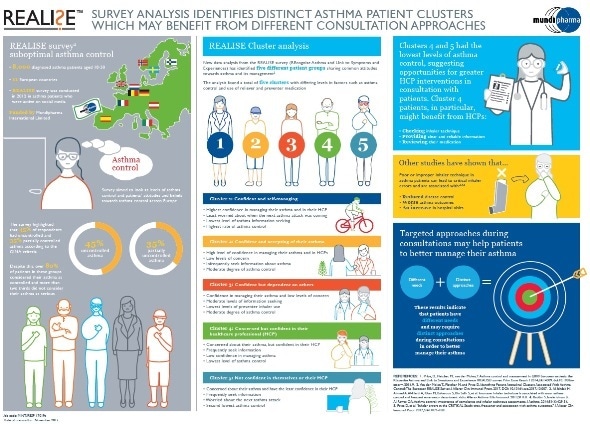New analysis identifies five distinct patient clusters that may need different approaches to manage asthma
New data analysis from the Mundipharma International Limited sponsored REALISE™ survey (Recognize Asthma and LInk to Symptoms and Experiences), published today in the Journal of Allergy and Clinical Immunology: In Practice has identified different patient groups sharing common attitudes towards asthma and its management. The analysis found a total of five clusters with differing levels in factors such as asthma control and use of reliever and preventer medication. These results indicate that patients have different needs and may require distinct approaches during consultations in order to better manage their asthma.
The five distinct patient clusters in this analysis were grouped and named according to the key characteristics comprising that cluster: 1. ‘Confident and self-managing’, 2. ‘Confident and accepting of their asthma’, 3. ‘Confident but dependent on others’, 4. ‘Concerned but confident in their healthcare professional (HCP)’, and 5. ‘Not confident in themselves or their HCP’. The final two clusters were associated with the lowest GINA-defined asthma control, suggesting an opportunity for greater HCP intervention in consultation with patients in these groups.
“It’s very important to take a holistic approach to asthma management, considering not only clinical characteristics, but psychological factors, such as patient attitudes and behaviors, which may have a real impact on treatment outcomes,” said Professor David Price, co-author of the REALISE™ publication, Chair of Primary Care Respiratory Medicine at the University of Aberdeen, Aberdeen, UK and Director of the Observational and Pragmatic Research Institute. “This cluster analysis has identified important patient attitudinal subgroups that might benefit from targeted approaches during consultations. HCPs will therefore need to communicate and engage effectively with each type of patient in order to improve overall management of their disease.”
Sub-optimal asthma control remains a major problem in Europe, with many patients experiencing largely preventable symptoms that disrupt their daily lives. Research suggests that only 20% of patients in Europe have controlled asthma according to the GINA definition. In addition, poor or improper inhaler technique in asthma patients can lead to critical inhaler errors and are associated with reduced disease control, worse asthma outcomes and an increase in hospital visits.
The REALISE survey aimed to look at levels of asthma control and patients’ attitudes and beliefs towards asthma control across Europe. It was an online survey and involved patients who were active on social media. It provides the largest pan-European data on incidence of exacerbations and symptoms, levels of GINA-defined control (Global Initiative for Asthma), as well as insights into patient attitudes. REALISE showed that people with asthma are still experiencing largely preventable symptoms that disrupt their daily lives. The survey highlighted that 45% of respondents had uncontrolled and 35% partially controlled asthma according to the GINA criteria, although more than two thirds of patients did not recognize this and did not consider their asthma as serious.























.png)











No hay comentarios:
Publicar un comentario